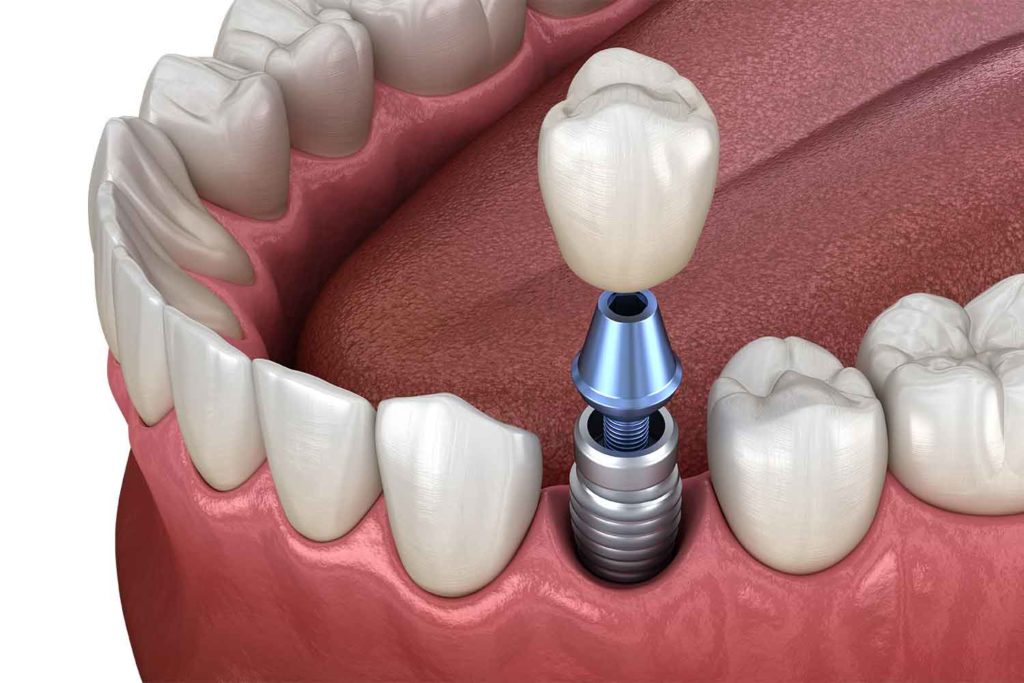A dental implant is the best option to replace a tooth. Implants are the only dental restoration to replace both the root and the crown of the tooth. Dentists may use dental implants to replace a single tooth, multiple teeth, or an entire arch.
Dental implants are a permanent, non-removable option to replace one or more missing teeth. Teeth restored with dental implants feel and function like your natural teeth. As part of restorative dentistry, dental implants are an excellent choice for patients seeking long-term solutions for missing teeth. The key to a successful dental implant procedure is careful planning and experience.
In some cases, implant-supported dentures may be recommended for patients who need to replace multiple teeth or a full arch. This advanced option provides stability and comfort while restoring the appearance and functionality of your smile.
Sometimes, your dentist will need to perform a procedure before placing the implant. For instance, a bone graft can replace the missing bone structure to strengthen the area before placing the implant. Experienced implant dentists, like Dr. Joe Burns, have expertise in preparatory procedures to prepare the mouth for an implant if needed. Fortunately, Dr. Joe Burns places dental implants in Ridgeland, MS, and provides personalized care to ensure every patient achieves optimal results.
A dental implant is an artificial replacement for a tooth root, generally made from titanium. The small threaded titanium posts integrate as a permanent part of your jaw, known as osseointegration. In due time, your new implant will serve as a solid base for aesthetic, lifelike restorations.
There are many different implant systems available and when competently used they all deliver a highly predictable restorative procedure.
The goal during the placement of an implant is to achieve immediate close contact with the surrounding bone. Over time further growth of bone onto the implant surface enhances the stability of the implant. As a result, creating a long-lasting restoration.
In order to support replacement teeth, dental implants normally have some form of internal screw thread or post space that allows a variety of components to be fitted. Once fitted, these components provide the foundation for long-term support of dental crowns, bridges, or permanent dentures.
Typically, a dental crown is supported by one post, a bridge by two or more posts, and a full implant-supported denture by four or more posts. Abutments are then affixed to the tops of the implants to securely hold your restorations in place. The abutments and your dental implants create a lasting solution for tooth loss, and with proper care, can last a lifetime.

Aside from the obvious oral health benefits, implants deliver a wide array of additional advantages. Our dental implants in Ridgeland, MS offer:
This is one of the most important features of dental implants. Once in place and supporting teeth, everyday functional forces (eating, smiling, talking) stimulate the surrounding bone, which responds by becoming stronger and denser. Like all things, there are limits as to how much an implant can do. For that reason, you may require one or more restorative procedures to prepare your oral cavity for implantation.
Before having dental implants placed, our dentist will follow routine steps to assess your oral, medical, and general health. He will carefully examine your oral cavity, including the area of your mouth where the potential implant is to be placed. Further, Dr. Burns will assess your bite and evaluate any esthetic concerns.
Additionally, you will take digital x-rays and special radiographs with a cone beam scanner. The cone-beam computed tomography or CBCT provides a view below the gum line. At this point, we can determine if you require any preparatory procedures to increase the predictability of the dental implant procedure.
Some common preparatory procedures include:
One or more restorative procedures may be necessary to prepare your oral cavity. Additionally, some can simply improve the longevity or durability of your results.
Both a bridge and a dental implant are solutions for replacing a missing tooth.
A bridge provides a replacement tooth by using teeth on either side of the missing tooth for support. Teeth adjacent to the missing tooth (or teeth) will need to be reduced, which may compromise the healthy teeth. Since a bridge does not replace the missing root structure, you are at an increased risk of bone loss over time. Keeping a bridge clean requires frequent cleaning to prevent bacteria buildup.
Another option is a dental implant, which serves as an artificial root, anchoring the replacement tooth in place. This also helps protect and preserve the area from tissue loss and recession. An implant can be cared for just like any natural tooth. It also does not require the removal of potentially healthy tooth structure from the neighboring teeth to support it.
Send us a message, and one of our patient coordinators will contact you soon.
Alternatively, you may call our Ridgeland office at (601) 956-5410.